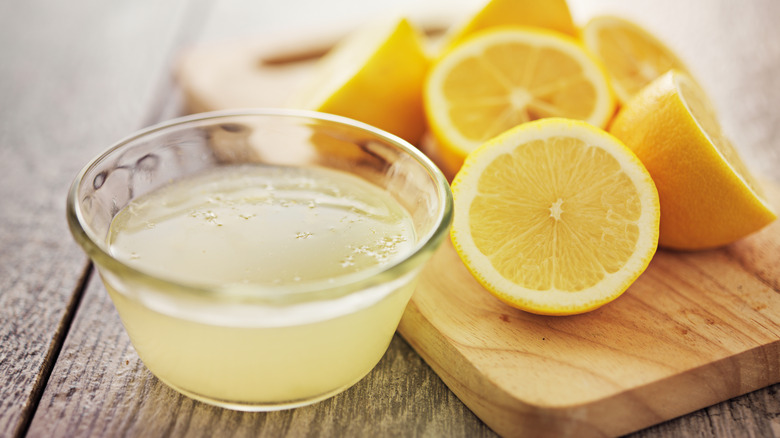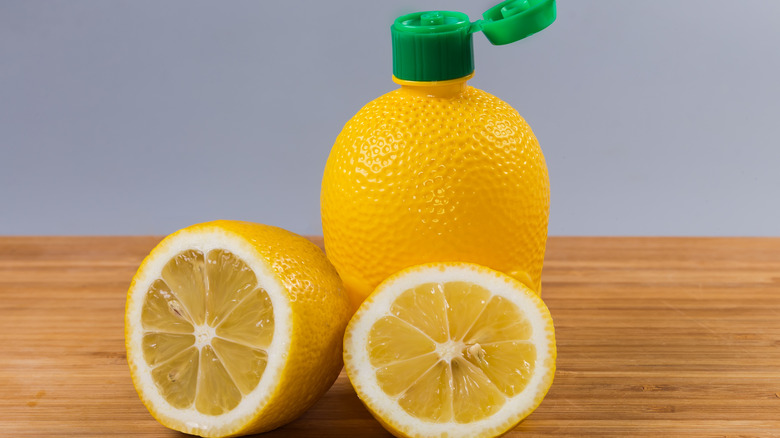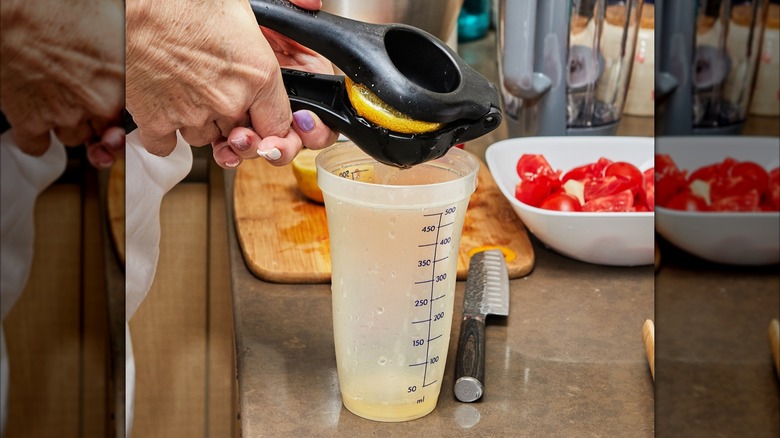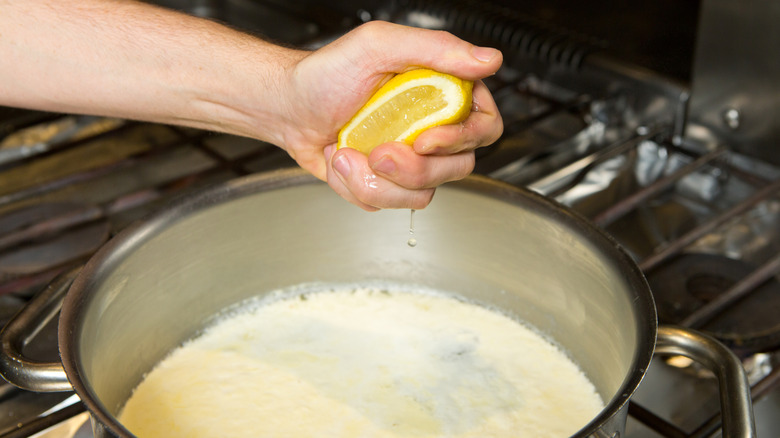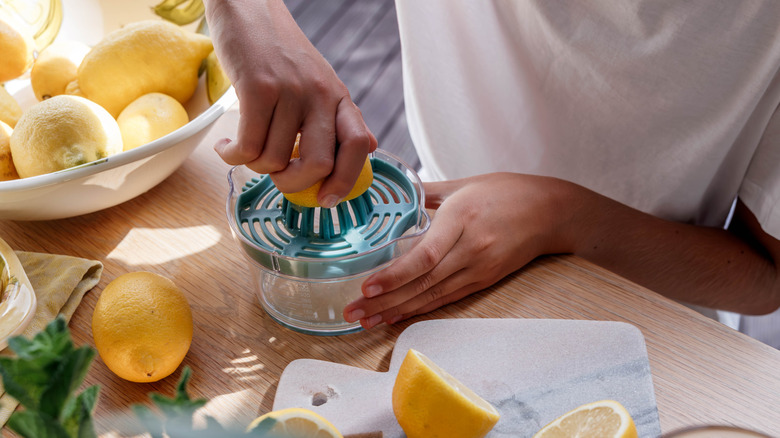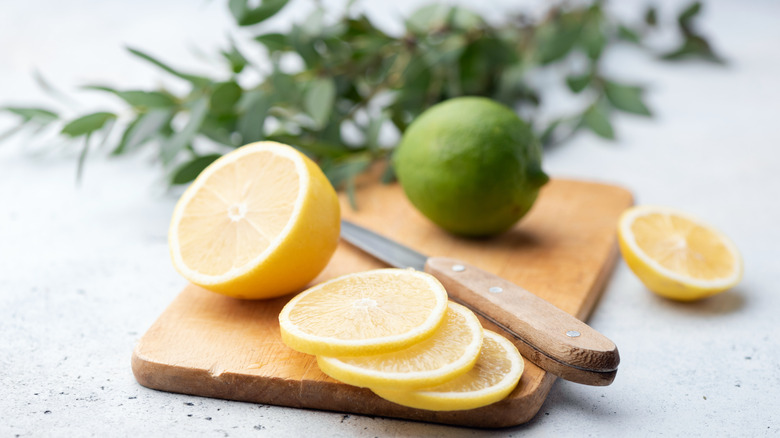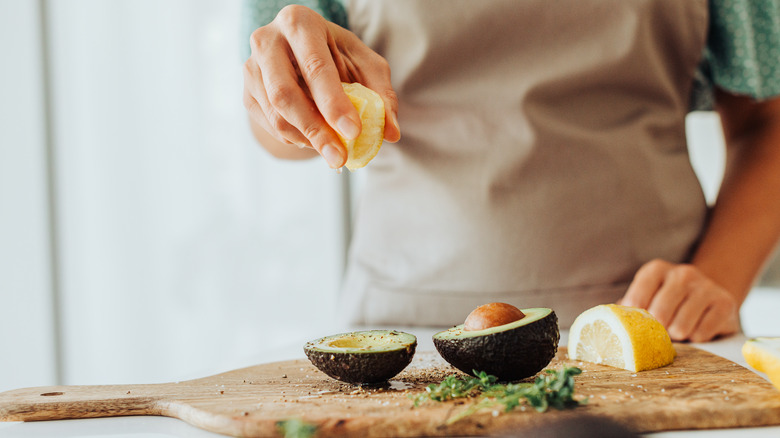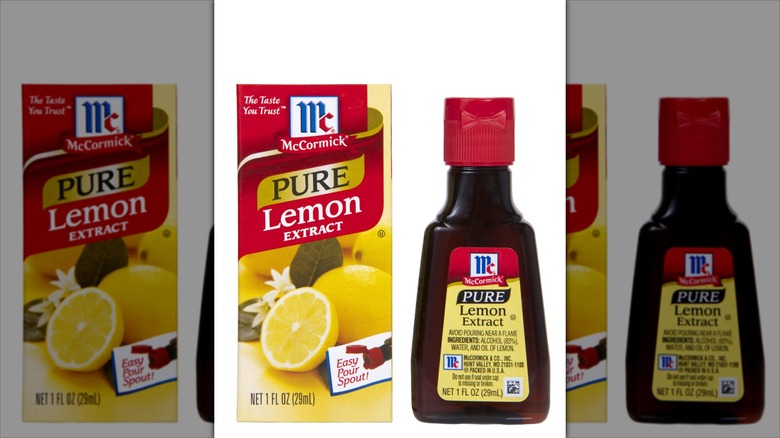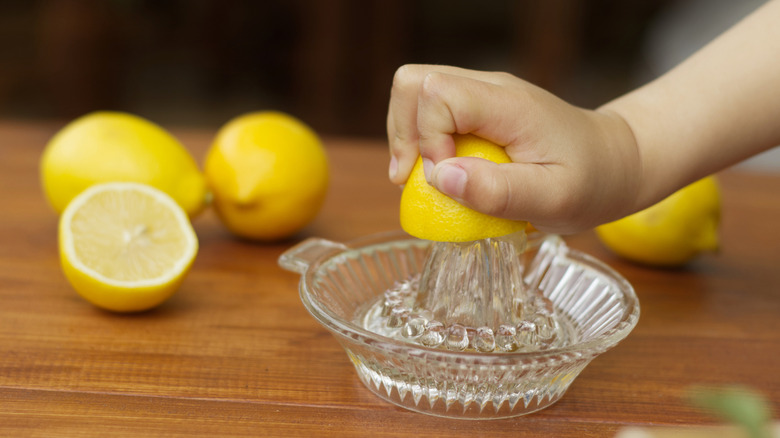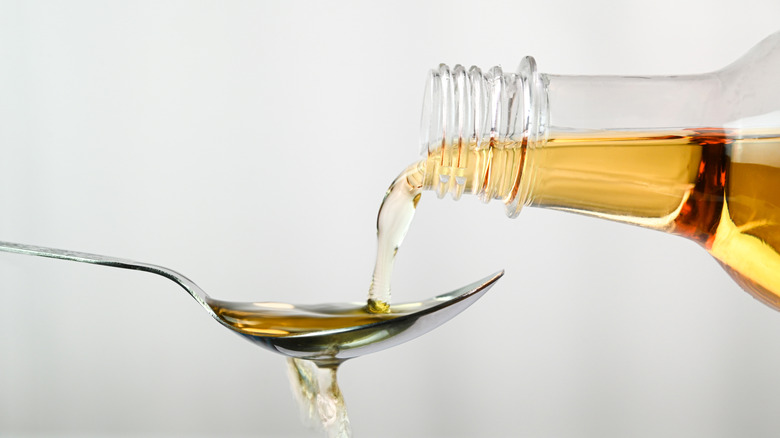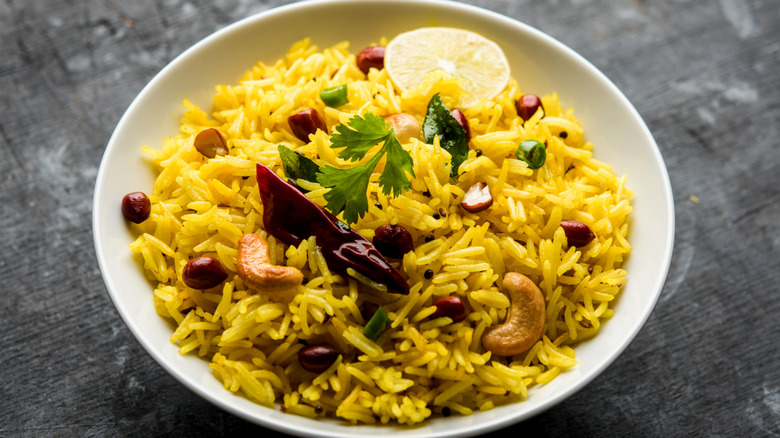Mistakes Everyone Makes With Lemon Juice
Lemon juice is a common ingredient in everything from pasta dishes to stews to desserts. In theory, it adds a bit of zing and brightness, but there are some mistakes everyone makes with lemon juice that can lead to it falling flat. And then there are the mistakes that won't mess up your dish but will waste your time. But once you know what they are, you can learn how to avoid them.
Perhaps you're adding lemon juice too early and causing your meal to come out with dull, muddy notes. Or maybe you haven't figured out the right way to balance dishes using citrus and your dishes are suffering for it. Whatever the issue, know that you're not alone.
While lemon juice might seem like a simple ingredient, there are all kinds of ways you can go wrong with it. Once you've learned how to master this everyday addition, your cooking will improve and you'll be able to level up even the most basic recipe. We're here to highlight the common missteps and tell you what to do instead.
Using lemon juice from a bottle
Using bottled lemon juice seems like a convenient shortcut, but what it offers in ease can't make up for what it lacks in flavor. The stuff from a bottle is usually pasteurized and packed with preservatives. Add this to the fact that the flavor mellows over time and you have lemon juice that lacks vibrancy and complexity. When you rely on the bottled version, you miss some of the subtle sweet, sour, and bitter notes that fresh lemons have, making your dishes feel flat.
That said, there are times when the predictability of bottled lemon juice is just the thing. For example, when making jam, you need precise acidity levels to ensure proper pectin activation and preservation. In these cases, the consistent pH of bottled lemon juice can be a lifesaver, reducing the risk of spoilage and guaranteeing a reliable outcome.
So, bottled lemon juice can occasionally be useful for specific applications like preserve-making, but it's generally a mistake to use it as a direct substitute for fresh juice in everyday cooking. And if you ever need huge quantities or just can't face juicing a lemon, opt for the single-ingredient kind, even if it is a splurge.
Neglecting to measure lemon juice in recipes
Failing to measure out your lemon juice can lead to unpredictable results in your recipes. While it may seem convenient to say, "use the juice of two lemons," the truth is that some lemons contain more juice than others. Their size, ripeness, and even age can cause significant variations in how much juice they yield. One lemon might provide an abundance while another could be more dry than juicy, leaving you with too little lemon and making your dish unbalanced.
By measuring the lemon juice, you get the precise acidity needed for the recipe to come out as it's supposed to. This is especially important in dishes with delicate flavors in which a small difference would be noticeable or where lemon is a key ingredient. Precision in your measurements removes the guesswork and variability from your cooking, so you get more consistent results every time.
Taking that extra moment to measure might seem like a minor detail, but it can be the difference between a well-balanced dish and one that falls flat. It's worth taking that couple of minutes to get consistent results. Of course, this can be a problem when a dish calls for a certain amount of lemons. But many recipes work on the assumption that one lemon equals 2 tablespoons of juice, so you can use this to work out your measurements.
Adding lemon juice too early
Another common misstep in cooking with lemon juice is adding it too early. While it might seem harmless, doing so can impact the finished dish. You won't get the bright, tangy finish that only a late splash of citrus can provide. There really is a right and wrong time to add lemon juice. So, you should think carefully about when you add it and avoid doing so early.
When you heat lemon juice for too long, it loses its delicate acidity. leaving your dish with muted, less vibrant flavors. It can even turn bitter and muddy if you add it too soon in certain dishes. Squeezing it in right at the end lets it keep its natural zinginess to contrast deeper, richer flavors in a recipe.
That said, there are some recipes in which you add lemon juice early on. More often than not, these are sweet recipes like cakes, pies, and curds. There's enough lemon juice in these kinds of recipes that there's no chance of the flavor cooking off.
Only juicing enough for a single recipe
Lemon juice goes in everything from soups and sauces to preserves and desserts, so you can end up squeezing lemons on the regular. When you use this citrus frequently, juicing only enough for a single recipe is a mistake. Sure, lemon juice doesn't last forever once squeezed, but it does stay fresh for a while. And that's something you should take advantage of.
It's not exactly hardcore meal prep, but you can save yourself time by juicing a number of lemons at the start of the week. You only get a couple of tablespoons of juice from each one, so if you cook from scratch daily, you might end up needing four or five lemons a week. This does depend on the kinds of dishes you make and how many people you're cooking for, though.
Freshly squeezed lemon juice will keep for around five days stored in a tightly sealed jar in the fridge. This way, you can just dip into it when needed. Since a lot of recipes only call for a tablespoon or so of lemon juice, it means you don't have to store partly squeezed lemon halves in the fridge — and it saves you time too.
Not adding lemon juice to eggs
One mistake you might be making with lemon juice is not using it to its full potential. Did you know that lemon juice can help give you fluffier scrambled eggs? It might sound odd but it's all down to how lemon juice interacts with the proteins in eggs — and you can't argue with science.
When you add a small amount of lemon juice as you whip eggs, the acidity affects the structure of the proteins. It makes the protein in the eggs stiffer, so it traps air bubbles more effectively and gives you lighter, airier results. The extra moisture also creates more steam making extra bubbles in the eggs as the liquid evaporates. So, what you're left with are the fluffy, pillowy eggs of your dreams.
You don't need much — just half a teaspoon for every six eggs — so it doesn't change the flavor significantly. It doesn't result in eggs that taste like lemon, but it does help balance the flavors, adding some brightness that cuts through the richness of eggs. So, your scramble will be fluffier and tastier. What's not to love?
Using lemon juice and lime juice interchangeably
It's a common misstep to assume that you can swap lemon juice and lime juice without consequence. While both give dishes a punch of acidity, they taste different and they're suited to different dishes. So, you can't just use whichever one you happen to have in the fruit bowl.
Lemon juice has more sugar and less citric acid than lime, so even though both their actual pH levels are similar, it seems less acidic than lime. It's noticeably sweeter and has some almost floral notes to it. Lemon juice is a good all-rounder that's often used in sauces, soups, stews, marinades, salad dressings, and so on.
Lime juice, on the other hand, is sharper and has a more assertive tartness with a hint of bitterness. It's the face behind the punch in Mexican ceviche, Thai curries, and peanut sauces. It cuts through spicy, robust flavors, making it the go-to in Latin American and Southeast Asian recipes where bold acidity is key.
You can't just use lemon in a recipe that calls for lime or vice versa without significantly changing the flavor of a dish. A recipe designed for the more nuanced brightness of lemon may lose its charm if overpowered by the more intense bitterness of lime. Conversely, relying on lemon in a dish that calls for lime might leave the flavor lacking.
Not using lemon juice to balance flavors
When you cook a dish, what makes it great is managing to balance the flavors in it. Balancing flavors means harmonizing sweetness, saltiness, umami, bitterness, and acidity so that no single element overwhelms the others. Lemon juice has a bright, clean acidity that can help you do just that.
Say you have a creamy pasta sauce or a hearty stew that feels a bit too heavy — a squeeze of lemon juice can cut through that richness. The acidity enhances other flavors and brings its own vibrancy too. Adding lemon juice creates balance by contrasting rich, umami flavors. Too much of one or the other can leave you with a boring or overpowering dish, but the perfect combination can make even simple dishes taste amazing.
You might also notice that in sweeter dishes, a splash of lemon juice can balance the sugary notes, creating a more rounded flavor. So many simple glazes and sauces use a mix of sweet and acidic ingredients for balance. It might also be part of why lemon desserts are so popular. The balance of sweet and tart in things like lemon meringue pie and lemon drizzle cake is nothing short of iconic.
Assuming lemon juice and lemon extract are the same
A mistake that can befall anyone is not understanding the difference between lemon juice and lemon extract and using them interchangeably. You might assume that lemon extract is just highly concentrated bottled lemon juice but it's a different beast. Using one in place of the other won't give you the results you're looking for.
Lemon juice is squeezed fresh from the fruit. It's both sweet and tart and can be used in a range of sweet and savory dishes. Lemon extract is a concentrated flavoring, made by steeping lemon zest in alcohol. It has an intense, potent lemon flavor that tends to be sweet but not particularly acidic.
Fresh lemon juice is an all-rounder, giving a true lemon flavor to a wide array of recipes. Lemon extract, on the other hand, is designed for use in baking. It gives you a lemony flavor in items like cakes and cookies without making them overly tart. In many recipes, it's used in conjunction with lemon juice. The juice brings the sharpness, while the extract makes the finished bake more intensely lemony, since the juice can cook off somewhat. By no means should you sub lemon extract in a dish that calls for lemon juice or you risk making something inedible.
Juicing lemons inefficiently
If you're not juicing your lemons efficiently, you might be wasting time and money. Not getting all the juice out means that some of it will go to waste and you'll need to buy more citrus sooner than you would have otherwise. It can also take more time if you're desperately squeezing, unsuccessfully trying to extract more juice.
So, how do you avoid making lemon juicing mistakes and do it the right way? One simple trick is to roll the lemon on the counter with your palm before cutting. This process helps break down the internal membranes, so you get more juice out quicker and more easily. You can also nuke your lemons in the microwave to produce more juice — about 20 seconds is the sweet spot. The brief heat softens the pulp, making it easier to release more liquid. It's a hack that restaurants use to increase their yield.
It might add an extra step but it's likely to save you time overall because you won't have to fight with your lemons to get all the juice out. You'll make your life easier and do your small part to reduce food waste while you're at it.
Failing to make the most of how versatile lemon juice is
If you're reading this thinking that you really don't use lemon juice that regularly, you might be making the mistake of ignoring how versatile it is. You can use it for a huge range of dishes, both sweet and savory. So, if you cook often, it should be something you reach for on more days than you don't.
It adds a pleasant zing to pasta dishes and risotto and livens up soups that could otherwise be flat and one-note. You can use it in sauces and dips like pesto, hummus, and Marie Rose sauce. It's great in marinades for all kinds of proteins and it has a place in both sweet and savory preserves. Add a splash to soy milk to curdle it, creating a kind of vegan buttermilk. Or soak your raw garlic in it to mellow it out when you don't want too harsh a flavor.
You can also use it in all kinds of desserts from the obviously lemony ones — like lemon cake and lemon meringue pie — to ones that aren't overtly lemon-bases, such as fruitcake. There are so many ways to use lemon juice and it's a shame not to make the most of it.
Incorrectly substituting lemon juice in dishes
If you're in a pinch, you can use lemon juice in place of other acidic ingredients in a recipe. And, likewise, there are ingredients you can use instead of lemon juice if you've run out of this versatile citrus fruit. However, the mistakes come when you substitute incorrectly. There's a subtle art to it, as acidity levels vary. And, of course, substituting one acid for another will always result in a different flavor.
So, what are the best substitutes for lemon juice? Vinegar is a good place to start, especially fairly neutral-tasting ones like rice vinegar and white wine vinegar. Apple cider vinegar is also a good choice and has some sweet, fruity notes like lemon. However, vinegar is more acidic than lemon juice, so it's best to substitute one part lemon juice for half a part of vinegar and adjust from there. That means, for every tablespoon of lemon juice in a recipe, you'd use half a tablespoon of vinegar.
White wine also brings acidity to dishes and helps elevate them. It's a good addition to pasta dishes, risotto, sauces, and similar, when lemon isn't on the menu. Dry whites have the most acidity, but naturally they don't have that lemony zing. You need significantly more wine than you'd use lemon juice — around a cup per tablespoon or two of lemon juice. Add wine before any other liquid ingredients and let it simmer and reduce before adding more liquids.
Not using lemon juice to make rice fluffier
Are you sick of shooting for the perfect fluffy grains and ending up making something dense and gluey? Lemon juice is the ingredient you need to make your rice fluffier. Nobody's quite decided on why it works, but it's a hack that people have been using for generations — and it might just save you from the tragedy of a dinner that misses the mark.
All you need to do is make your rice as usual but add around half a teaspoon of lemon juice and you'll end up with those separated fluffy grains that can be so hard to achieve. No more disappointingly dense or porridge-like results for you. There's also the option of adding extra lemon if you want its flavor to come through.
While it's still unclear why this trick works, it's pretty much foolproof. Some experts believe it could be the vitamin C in lemon juice that makes the magic happen but we don't need to understand it to make the most of it.
